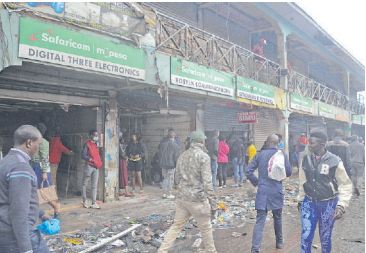

Protests, rising price pressure and weaker order inflows in July led to the sharpest pace in the decline of private sector operations in 2025, the latest industry barometer shows.
Kenya witnessed heightened destruction, especially in Nairobi's Central Business District in June as protestors commemorated lives lost in last year’s Gen Z protests.
On
July 7, close to 60 lives were lost and property running into billions of shillings destroyed in yet another protest against state brutality.
The
downturn led to a marked reduction in input purchases and a slight dip in
inventories, although staffing numbers were broadly stable, supporting backlog
depletion.
Companies in the country also reported a quicker increase in input prices, with the pace of inflation climbing to a seven-month high. Subsequently, average selling charges rose to the greatest degree since January.
The
headline Purchasing Managers’ Index (PMI) dropped for the third consecutive month in
the month under review to 46.8 points from 48.6 in June, signalling a solid
downturn in the health of the private sector economy.
Readings
above 50 points indicate improvement in business conditions on the previous
month, while readings below 50 show a deterioration.
Moreover,
this marked the sharpest decline in operating conditions since July 2024.
Business activity fell at the strongest pace in a year in July, with 38 per cent of survey respondents signalling a downturn over the month.
“The decline was largely concentrated in the manufacturing and services sectors, conflicting with higher output across agriculture, construction and wholesale and retail,’’ the report reads.
Businesses
reportedly curbed their output because of lower sales volumes, cash flow
problems, political unrest and accelerating inflationary pressures.
Selling
prices rose at a solid pace in July as businesses
passed the cost to consumers, pushing the cost of living to its fastest pace in six
months and line with the survey's long-run trend.
Total
new orders also declined, and at the sharpest rate for 12 months. Sales volumes
shrank again at the start of the third quarter. The month-on-month downturn was
the third seen in succession and sharp overall, as the respective seasonally
adjusted index fell to its weakest print since July 2024.
According
to survey members, orders were often curtailed by higher inflationary pressures
and lower customer spending, as well as recent protests.
Companies
made successful attempts to reduce their work-in-hand in July, as weaker demand
freed up capacity.
While
modest, the decrease in backlogs was the greatest recorded since April
2021. Backlog clearance was helped by employment levels remaining stable.
With
workloads falling, companies scaled back their purchasing activity sharply in
July. The reduction was the fastest in almost three years, led by marked
cutbacks among manufacturers. Stocks of purchases also fell, representing the
first monthly decline in 2025 so far.
Input
cost inflation rose during July, driven by a steep increase in fuel prices as
well as higher tax payments, according to respondents.
Notably,
overall cost burdens increased at the fastest pace in seven months. Several
firms opted to pass through higher costs to customers, resulting in a solid
rise in selling prices that was the most marked since the start of the year.
According
to Christopher Legilisho, Economist at Standard Bank, pricing pressures
increased due to a rise in fuel prices by the Energy and Petroleum Regulatory
Authority (EPRA) in July.
Firms
also complained that higher taxes contributed to an increase in purchase and
operating costs.
“Overall,
the private sector activity is mixed in the sense that certain sectors are doing
well, while other sectors are struggling under the weight of weak consumer demand
conditions.”
For
the second month running, Kenyan businesses were more optimistic about future
activity in July. The degree of confidence rose to its highest level in 15
months.
Positive
sentiment was linked to new product releases, land purchases, reoriented marketing
plans and branch openings.
















